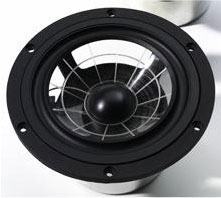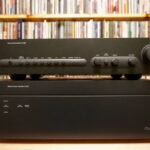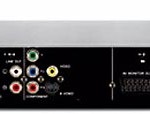First impressions are everything, or so the cliché goes. In this instance, my initial sonic impression was that I had made a set-up mistake and wired up the Synergistic Tesla Apex cables to a different and much larger loudspeaker. Convinced I was going to descend into the world of miniaturized soundstages and hyperclinical tonal profiles common to so many small compacts, I was surprised by the Haydn’s overall natural tonal balance-more akin to larger speakers designed to move greater amounts of air. In reality, the Haydn was a veritable explosion of uncanny dynamic poise (even near orchestral-assault levels), tightly defined midbass, natural transient response, and authoritative midrange voicing that far exceeded its modest physical size. A singer like Jennifer Warnes retained lifelike scale and full-blooded energy. During “Song Of Bernadette” [Famous Blue Raincoat, 20th Anniversary Edition, Shout], her voice sounded as if it were firmly rooted to the stage, rather than just an amorphous presence disengaged from chest and throat. Reinforcing this impression were the Haydn Grand’s generally warm character, full lower midrange and upper bass, carefully tuned midbass, and slightly restrained upper-mids, which relaxed and darkened vocals somewhat.
going to descend into the world of miniaturized soundstages and hyperclinical tonal profiles common to so many small compacts, I was surprised by the Haydn’s overall natural tonal balance-more akin to larger speakers designed to move greater amounts of air. In reality, the Haydn was a veritable explosion of uncanny dynamic poise (even near orchestral-assault levels), tightly defined midbass, natural transient response, and authoritative midrange voicing that far exceeded its modest physical size. A singer like Jennifer Warnes retained lifelike scale and full-blooded energy. During “Song Of Bernadette” [Famous Blue Raincoat, 20th Anniversary Edition, Shout], her voice sounded as if it were firmly rooted to the stage, rather than just an amorphous presence disengaged from chest and throat. Reinforcing this impression were the Haydn Grand’s generally warm character, full lower midrange and upper bass, carefully tuned midbass, and slightly restrained upper-mids, which relaxed and darkened vocals somewhat.
On a more general note, I’ve been noting (with admiration) a new level of dynamic composure and ultimate output in small speakers of late-from the recently reviewed Amphion Ion to the PSB Alpha B and Silverline Minuet. Each maintains its intrinsic tonal character and balance even as output levels push SPL meters into the red. Nor does any, on most occasions, demand a subwoofer. The latest small speakers no longer exact a stiff penalty for their modest profiles. The Haydn Grand joins this group and happily raises the ante a couple of notches. It’s a speaker that will gladly “play chicken” with your darker headbanger habits, until you decide to save your hearing and take your foot off the volume pedal.
Perhaps the best illustration of what the Haydn Grand is all about is a quirky track from Norah Jones’ recent album. The song “Broken” [Not Too Late, Blue Note] is a spare mix of electric guitar, cello, and pizzicato and bowed doublebass arranged in a jumpy, highly punctuated style. Jones’ vocal is round and full, and you can easily hear the added top end courtesy of the engineer. The strings are warm yet detailed enough to be identified as the bowed instruments they are. The transients off the plucked bass viols have plenty of texture and micro-dynamic nuance. Even more of a revelation is the doublebass’ rosiny transient growl, quickly followed by the warm bloom off the soundboard, as the bassist digs into the bottom octave of his instrument. Resolution of this information might be expected on a three-way or, at minimum, a small floorstander, but it’s hardly a slamdunk in a speaker of this size.
The Haydn’s solid midbass response stabilizes and broadens the soundstage and lends even Dire Straits-style melodrama [Brothers In Arms, Warner] genuine foundation. There are no cabinet resonances that I can hear, either. However, there were moments when a bit of thickness in the lower bass suggested the greater burden being placed on the port, in support of the 6″ midbass driver. Under stress, this could slow the speaker down slightly in the lower octaves, especially in comparison to its sparkling transient behavior at the other end of the spectrum. But make no mistake: The Haydn Grand achieves a small speaker balancing act worthy of a gymnast.






